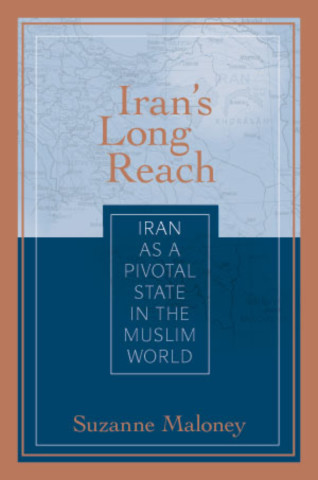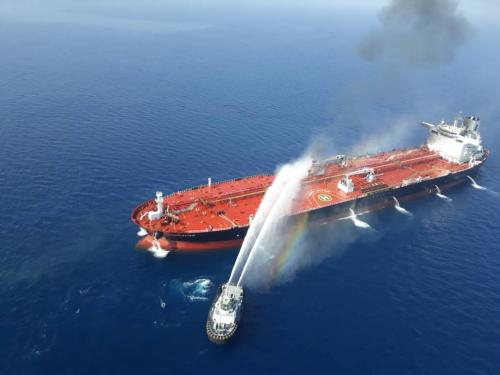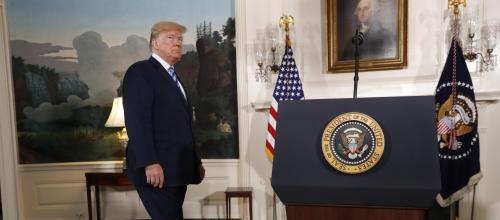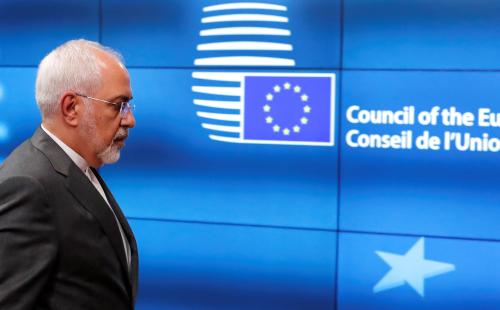As the standoff in the Gulf continues, the new prime minister must work with the U.S. on a constructive approach to Tehran, writes Suzanne Maloney. This piece originally appeared in The Guardian.
Boris Johnson is taking the helm with an urgent crisis brewing in the Gulf, where Iran’s seizure of a British oil tanker threatens to pull the UK and the international community into the escalating friction between Washington and Tehran. But in crisis there is opportunity, and the new prime minister should use his affinity with Donald Trump to de-escalate responsibly while reinforcing the battered transatlantic relationship around Iran.
Tehran has accused the tanker, the Stena Impero, of colliding with a fishing boat and violating international regulations. However, the seizure came shortly after Iranian leaders threatened to retaliate for the British seizure of an Iranian-flagged vessel in Gibraltar over suspicions that the ship had violated European Union sanctions on Syria.
The standoff has erupted in a climate of broader tensions in the Gulf since the Trump administration began ratcheting up economic pressure on Tehran. After the latest intensification of US sanctions in May, Iran-linked proxies have launched attacks on at least four tankers as well as a Saudi pipeline and various American facilities in Iraq. Last month, the two countries narrowly avoided a direct military confrontation; after an Iranian surface-to-air missile downed an American drone, Trump gave initial approval for strikes on Iran before reversing the order and authorising cyberattacks and additional sanctions.
Tehran’s provocations are unfortunate but hardly unanticipated. Its seizure of the Stena Impero is consistent with Iran’s longstanding strategic doctrine that advocates a forceful response to pressure as the most effective means of deterring even greater pressure. In this case, the counter-response is part of a broader gambit aimed at extricating Iran from the prospect of an unremitting state of economic siege imposed by Washington.
The Trump administration’s May 2018 decision to exit the 2015 nuclear deal has proven catastrophically effective, at least in terms of its impact on Iran’s economy. Reimposed US economic sanctions have slashed Iran’s oil exports, severed its banking relationships with the world and generated high inflation and shortages for ordinary Iranians.
Tehran has long experience of economic challenges, beginning with the 1979 revolution and the brutal eight-year war with Iraq that followed. And Iranian leaders have considerable expertise in mitigating US sanctions. But an indefinite American stranglehold represents an existential threat for a regime whose ageing leaders are trying to maintain control over a dynamic, well-educated society hungry for opportunity and engagement with the world.
Iranian leaders initially sought economic relief from Europe, to little avail. European governments are deeply committed to sustaining the nuclear deal, but they proved powerless to forestall European firms from rushing to exit Iran for fear of US penalties. Although Europe has finally launched a banking channel to preserve some humanitarian trade with Iran, it’s clear that Europe can’t appreciably offset the costs of the US withdrawal from the deal.
Faced with a bad hand, Tehran is using the tools at its disposal, its prodigious destabilising capabilities, to change the status quo in its own favour. Iran’s supreme leader, Ayatollah Ali Khamenei, has argued that Washington seeks to weaken Iran through pressure, and after the country has been debilitated, to use negotiations as a mechanism for stealing Iranian rights and capabilities. He insisted that Iran has to deploy its own pressure tactics to outmanoeuvre this trap.
From this viewpoint, Iran’s escalations make dangerous sense. Provocations in the Gulf inject urgency among the other stakeholders to the nuclear deal. The threat to shipping raises the costs associated with a continued crisis, both in financial terms, via skyrocketing insurance premiums for tanker traffic, and geopolitics, by raising fears of a larger and more ruinous military confrontation. For Tehran, war jitters may galvanise more serious international efforts to restrain Trump’s hawkish policies. And the risks may also influence Washington’s calculus, particularly for a president in the throes of a re-election campaign who watches petrol prices closely and has long inveighed against another US military intervention in the Middle East.
The attacks helpfully intimidate some of Iran’s neighbours, by threatening to disperse the pain and consequences of Trump’s policy on to those governments that have been its most ardent cheerleaders. Even better, the seizure of the Stena Impero can be justified as a commensurate response to the impounding of the Grace 1 – a strong counter-response to perceived British bullying has considerable appeal for an Iranian public beleaguered by economic suffering.
Together with its recent efforts to inch away from the nuclear deal’s restrictions, increasing frictions in the Gulf unfortunately have strengthened Iran’s position. Tehran will take care to avoid inadvertent escalation or a wholesale breach with Europe, but so far Iranian leaders are gaining more traction with provocation than the “strategic patience” they displayed during the first year after Trump exited the deal.
Britain and the US also need to strike a careful balance in responding to this latest incident. Trump’s hesitancy to use force after June’s drone strike has emboldened Tehran, so it’s imperative that Iranian leaders appreciate the costs of continued harassment of civilian shipping in the Gulf will vastly outweigh any leverage Iran hopes to accumulate. Johnson is well situated to work with Washington to reinforce this message and rebuild a common approach to Gulf security.
At the same time, Johnson should seek to revive serious diplomacy with Iran. Expectations must be modest; there is no realistic prospect of a new comprehensive agreement that addresses all of Washington’s demands. But a fresh negotiating process can provide openings for resolving specific issues, such as Iran’s unjust detention of foreign nationals including Nazanin Zaghari-Ratcliffe, as well as opportunities for reducing conflict in the Gulf and confidence-building around the region. The alternative – incessant threats to the world’s most important energy corridor and the perpetuation of the US vice-like grip on Iran’s economy – would be ruinous for all sides.








Commentary
Boris Johnson can use his affinity with Trump to calm the crisis over Iran
July 26, 2019